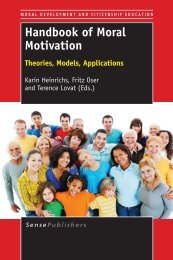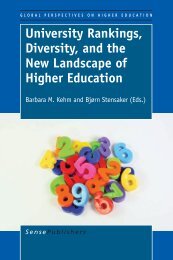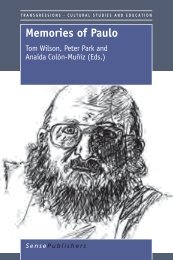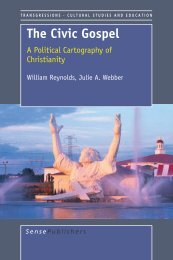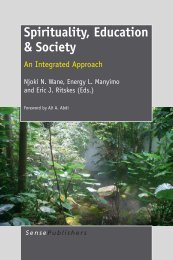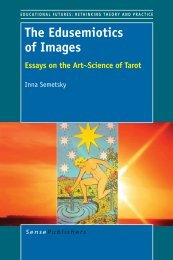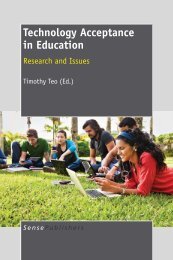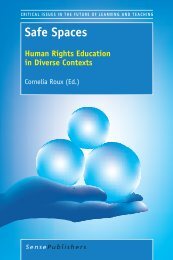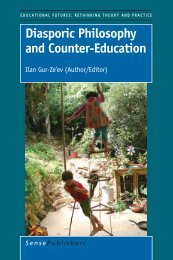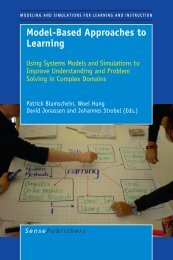Rupturing Concepts of Disability and Inclusion
Rupturing Concepts of Disability and Inclusion
Rupturing Concepts of Disability and Inclusion
Create successful ePaper yourself
Turn your PDF publications into a flip-book with our unique Google optimized e-Paper software.
CHAPTER 2<br />
Therefore, critical theoretical researchers seek to uncover political <strong>and</strong> structural<br />
dimensions <strong>of</strong> research; <strong>and</strong> to articulate different frameworks <strong>of</strong> social relationships<br />
in terms <strong>of</strong> their ethical implications. 98<br />
A conceptual theoretical analysis, in the context <strong>of</strong> this research, also accounts<br />
for experience. This research is embedded in passion gained from personal<br />
experience. As a woman, as a person <strong>of</strong> a lower class background, as a person who<br />
has been employed in various human services; <strong>and</strong> as a person who was a cohouse-parent<br />
for four years to five young people with intellectual disability in<br />
suburban community, I share the experiences <strong>and</strong> the challenges <strong>of</strong> marginalisation.<br />
Yet I also know the richness for having had these <strong>and</strong> many other experiences. I<br />
know the joy <strong>of</strong> being in relationship with people who are different, though<br />
similarly human. I know that through accepting relationships <strong>of</strong> mutuality <strong>and</strong><br />
solidarity, referential acts <strong>of</strong> inclusion become irrelevant; <strong>and</strong> integrality in<br />
community is an achievable goal. Therefore, with these experiences, I can situate<br />
myself as co-subject, <strong>and</strong> acknowledge the influence <strong>of</strong> my experiential knowledge. I<br />
insert my womanly voice <strong>and</strong> view into the commentary. With a hermeneutics <strong>of</strong><br />
suspicion towards hegemonic constructions, I undertake a feminist position in<br />
questioning. 99 This experience, juxtaposed with formal scholarship <strong>of</strong> nursing<br />
training, social science <strong>and</strong> textual studies provides a rich multidisciplinary<br />
medium by which to contextually explore the ethical significance <strong>of</strong> inclusion.<br />
Having stated these contentions, this research is also qualitative <strong>and</strong> multidimensional.<br />
As a framework <strong>of</strong> qualitative research, I call on the recent work <strong>of</strong><br />
Yvonne Lincoln <strong>and</strong> Norman Denzin. 100 From a collection <strong>of</strong> thirty-five works,<br />
Lincoln <strong>and</strong> Denzin, in the concluding chapter, highlight a tension that now defines<br />
qualitative research. They contend that there is an illusive centre to what can be<br />
described as a “contradictory, tension-riddled enterprise”. 101 This is a centre which<br />
is presently moving further <strong>and</strong> further away from gr<strong>and</strong> narratives, <strong>and</strong> single<br />
overarching ontological, epistemological <strong>and</strong> methodological paradigms. They<br />
claim that the “centre lies in the humanistic commitment <strong>of</strong> the researcher to study<br />
the world always from the perspective <strong>of</strong> the interactive individual.” 102<br />
Lincoln <strong>and</strong> Denzin, therefore, nominate six fundamental issues embedded in<br />
these tensions. They describe these in their text as:<br />
– Researchers continually wrestling with their research’s topic in relationship to<br />
previous positivist <strong>and</strong> post-positivist formulations;<br />
– Crisis <strong>of</strong> representation, speaking to the ‘other’ <strong>and</strong> its representation in our texts;<br />
<strong>and</strong><br />
– Crisis <strong>of</strong> legitimation, whereby, in speaking to the ‘other’, the authority we claim<br />
for our texts is challenged;<br />
– The continued emergence <strong>of</strong> a cacophony <strong>of</strong> voices speaking with various agendas<br />
from specific gender, race, class, ethnic <strong>and</strong> Third World perspectives (ability can<br />
be included in this list);<br />
– Throughout its history, qualitative research has been defined in terms <strong>of</strong> shifting<br />
scientific, moral, sacred <strong>and</strong> religious discourses. Although since the Enlightenment,<br />
science <strong>and</strong> religion have been separated if only at the ideological level, (for, in<br />
practice religion has constantly informed science <strong>and</strong> the scientific practice), there<br />
is now a more overt blurring <strong>of</strong> the boundaries as science moves away from its<br />
24




